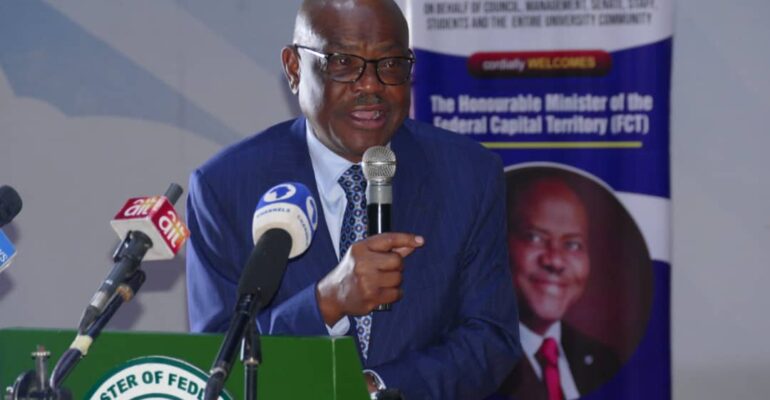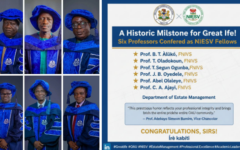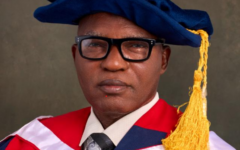Wike Ignites Hope at OAU, Urges Nigerians to Reclaim National Dream
June 5, 2025 2025-06-05 21:01Wike Ignites Hope at OAU, Urges Nigerians to Reclaim National Dream
In a dazzling and cerebral address that reverberated through the hallowed halls of Obafemi Awolowo University (OAU), Ile-Ife, His Excellency Ezenwo Nyesom Wike, Minister of the Federal Capital Territory, delivered an electrifying call to action at the institution’s inaugural Distinguished Personality Lecture.
Speaking to a packed audience in Oduduwa Hall, Wike painted a vivid portrait of a Nigeria reborn—one where leadership is purposeful, infrastructure bridges destinies, and democracy thrives beyond the ballot box.
Titled “Nigeria of Our Dreams,” the lecture challenged Nigerians to rise above despair and actively forge a nation that mirrors its boundless potential. The event, a landmark in OAU’s storied history, drew an illustrious crowd, including the royal father, His Imperial Majesty Ooni Adeyeye Ogunwusi, Ojaja II, Osun State Governor Senator Ademola Adeleke, represented by the Deputy Governor, Prince Kola Adewusi, the Pro-Chancellor and Chairman of the Governing Council of the University, Distinguished Professor Siyan Oyeweso, and all the members of Council, the Vice-Chancellor, Professor Adebayo Simeon Bamire, and all other principal officers of the University, and a constellation of dignitaries from across Nigeria’s political and academic spheres.
As the first in the lecture series designed to bridge the chasm between academia and governance, Wike’s appearance projected OAU’s enduring role as a crucible for national discourse. Wike, a political titan whose career spans local government chairmanship to gubernatorial leadership and now federal ministry, began by tracing Nigeria’s trajectory from its euphoric independence in 1960 to its current struggles.
“The Nigeria we see today is not the Nigeria we dreamt of,” he declared, pinpointing corruption, mediocrity, and leadership failures as the culprits behind the nation’s faltering dream. Yet, his tone was not one of lament but of resolute optimism. “The dream is not dead,” he insisted. “It merely sleeps, waiting for those bold enough, brave enough, and burdened enough to awaken it.”
The Minister outlined a blueprint for this awakening, articulating eleven pillars of the “Nigeria of Our Dreams”—from purposeful leadership and infrastructural development to education, security, and a cultural renaissance. Drawing from his tenure as Rivers State Governor—where he earned the moniker “Mr. Project” for his infrastructure feats—and his current transformation of Abuja, Wike emphasized that “infrastructure is the architecture of equality.”
He lauded President Bola Ahmed Tinubu’s Renewed Hope Agenda, citing initiatives like the Nigeria Education Loan Fund (NELFUND) as evidence of a government committed to tangible progress.
The lecture was framed by eloquent remarks from OAU’s leadership. The Vice-Chancellor, Professor Bamire, in his welcome address, hailed Wike as “one of the most pragmatic and results-driven public servants of our time,” noting his bold urban renewal initiatives in the FCT.
Bamire seized the moment to appeal for Wike’s support in addressing OAU’s infrastructural deficits, proposing a legacy project like a Centre for Good Governance and Youth Leadership. “We have tasted your transformative work in Abuja,” he said. “We would love to experience such impact here.”
The Pro-Chancellor, Professor Oyeweso, in a speech rich with historical allusion, framed Wike as a Hegelian “great man of the age”—a leader who actualizes the will of his time. “His Excellency is a significant phenomenon in the history, politics, and governance of Nigeria,” Oyeweso remarked, celebrating Wike’s journey from grassroots leadership to national prominence.
He positioned the lecture series as a vital bridge between “town and gown,” urging sustained collaboration between Universities and government for national development.
Also speaking, His Imperial Majesty Ooni Adeyeye Ogunwusi, Ojaja II, lent regal gravitas to the occasion with extemporaneous reflections that captivated the audience. “Our nation stands at a crossroads, but its soul remains vibrant in our cultures and traditions,” he said.
“Governor Wike’s vision reminds us that progress begins with honoring our roots—integrity, unity, and the wisdom of our ancestors. Let us weave our diverse threads into a tapestry of strength, for only together can we craft the Nigeria we dream of.” His words, steeped in cultural resonance, underscored the lecture’s call for a moral and communal rebirth.
Wike’s address was as much a diagnosis as it was a prescription. He decried the erosion of values—where “wealth is worshipped from the pulpit” and the Nigerian passport elicits suspicion abroad—yet refused to surrender to pessimism.
Comparing Nigeria to peers like India, which has soared while Nigeria stagnates, he urged a rekindling of belief and action. “Change does not come from the top alone,” he asserted. “It bubbles up from the conviction of a determined people.”
His eleven-point vision was both granular and grand. On leadership, he echoed Chinua Achebe’s lament of its scarcity, praising Tinubu’s courage in tackling fuel subsidies and insecurity. On education, he called it “the bedrock of national development,” while on security, he stressed that “no dream can flourish in an atmosphere of fear.”
Unity in diversity, he argued, must be forged through trust and dialogue, not division—a sentiment that resonated deeply in a nation often fractured by ethnicity and faith.
As Wike concluded, his voice rose with a preacher’s cadence: “Nigeria of our dreams will not fall into our laps by wishing; it will be won by working.” The audience—students, scholars, and dignitaries alike—erupted in applause, the weight of his challenge settling over Oduduwa Hall. It was a summons not just to dream, but to labor; not to critique from the sidelines, but to build with resolve.
For OAU, the lecture was a triumph of intellectual ambition, reaffirming its legacy as Nigeria’s “conscience.” For Wike, it was a platform to cement his stature as a statesman unafraid to confront hard truths. And for Nigeria, it was a clarion call at a pivotal moment—when economic woes, insecurity, and youth disillusionment threaten to drown out hope.
As the sun dipped below Ile-Ife’s rolling hills, Wike’s words lingered: “Let history record that we gathered here not to mourn what Nigeria has become, but to proclaim what Nigeria must be.”
In a nation yearning for direction, the 2025 Distinguished Personality Lecture offered not just a vision, but a roadmap—one that demands every Nigerian’s hand to pave.






